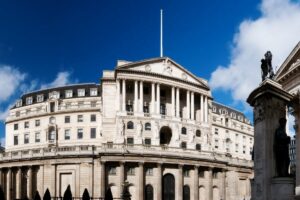David Ricardo. Born March 1772 in London. Died September 1823 at Gatcombe Park, Gloucestershire.
“Money is neither a material to work upon nor a tool to work with”
Wheeler Dealer
Just for once, our pioneering economic thinker was also a successful stock market player. Ricardo came from a wealthy Sephardic family that had already made a financial fortune, but he then turned broker and financial market speculator, and eventually amassed a further fortune – with which he retired and bought a seat in the UK Parliament.
That fortune appears to have been gained through a disgraceful ruse in which he deliberately started a bond market panic by appointing an observer at the battle of Waterloo and then hitting the sell button, so that the market would believe that he knew Napoleon had won. Whereupon he moved in and cleaned up. His Times obituary recorded that this single manoeuvre had netted him “upwards of a million sterling”.
A Founding Father Nevertheless
But then, economics was a wide-open discipline in the 18th century, long before Marx or JS Mill had written anything, and like his contemporary Adam Smith he found a ready acceptance of his theoretical ideas in a field where ethical certainties were not so clearly defined as they are today. Ricardo is rightly revered for his early contributions to the theory of international trade, and also his ideas about the value of money. Even though he often couched them in infuriatingly vague and unsystematic ways.
First Blood Against the Bank of England
Ricardo was 27 years old before he even read a book about economics (Adam Smith’s Wealth of Nations, 1799), and he was 38 before he published anything of his own. (A series of letters called The High Price of Bullion, in which he railed against banks printing money in order to increase their lending potential.) Ricardo and his contemporaries disputed the denials of the Bank of England, which asserted that there had been no immediate link between the volume of banknote issues and the level of prices since the suspension of the requirement to back note issues with gold.
Furthermore, Ricardo argued that the price levels in turn affected foreign exchange rates. All of which seems mainstream nowadays, although at the time it was enough to see him catapulted to influence with the parliamentary Bullion Committee, which agreed with his insistence that the Bank Restriction Act should be repealed and that the BoE should henceforth shape its lending policies around general economic conditions and control the issue of money and credit.
Ricardo ruffled many feathers with his insistence that it was futile to try and raise workers’ living standards by paying them more, which would only result in driving prices up. His sense that there was a ‘natural’ wage and a ‘natural’ level of unemployment rankled deeply, but he was still counted as a liberal by Malthus and JS Mill.
Comparative Advantage
But it was his ideas about international trade that proved the most striking, and probably the most contentious. Ricardo argued that everybody gained from trade even if one country happened to be more competitive in every single area than its trading counterpart. (Try telling that to the anti-globalisation lobby.) But Ricardo went further by declaring that a country ought to focus its resources tightly on those industries where it had a comparative advantage (i.e. a competitive edge.) Indeed, he even suggested that it should ditch anything but the most competitive industries.
That’s a policy that hasn’t been tried since the East European job-specialisation of the Comecon era. With hindsight, letting the Czechs build the cars while the Bulgarians grew the vegetables wasn’t such a great idea. For Bulgaria, anyway….

















